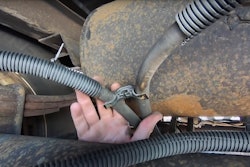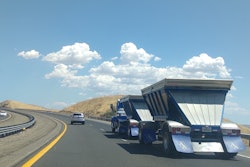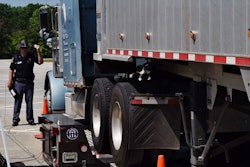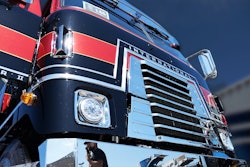Trucking news and briefs for Wednesday, May 31, 2023:
Freightliner Cascadias, Western Star 5700s subject of NHTSA look at unexplained braking events
The National Highway Traffic Safety Administration has launched an investigation after a series of complaints involving the automatic emergency braking (AEB) systems on Freightliner Cascadia and Western Star 5700 trucks.
According to NHTSA documents, the AEB system on the trucks “may inaccurately identify an object and command the vehicle to stop unexpectedly, resulting in a hazard to other motorists.” There have been 18 complaints filed to the agency, resulting in NHTSA launching a preliminary evaluation.
The investigation includes an estimated 250,000 Daimler trucks equipped with AEB systems. Daimler Trucks North America (DTNA) said in a statement that it is “fully committed to the development of life saving technologies such as Automatic Emergency Braking that have the potential to greatly improve roadway safety.”
The company added that it shares the same mission as NHTSA “to reduce fatal crashes and serious injuries, and looks forward to continued collaboration with the agency to review AEB technology and the upcoming regulation and test procedures that are being developed for the industry by NHTSA.”
[Related: Speed limiters, other regs proposals slated for 2023]

NHTSA said in its investigation documents that the 18 complaints allege errors in the AEB system on model year 2017-'22 Freightliner Cascadia and Western Star 5700 trucks produced by DTNA.
“Drivers report activation of the AEB without an actual roadway obstacle, also known as a false positive event,” NHTSA said. “The reports indicate the subject vehicle will apply the service brakes without warning or input from the driver. The applications range from momentary, partial application with little loss of speed to full application, which brings the vehicle to a complete stop in the travel lane.”
NHTSA added that its Vehicle Research and Test Center tested a Freightliner Cascadia AEB-equipped vehicle, and, during the "steel trench plate" scenario, the vehicle initiated hard braking when the plate was detected. DTNA told NHTSA that the steel trench plate was not representative of real-world driving.
The agency’s preliminary evaluation was opened “to evaluate the issue and determine whether the alleged defect creates an unreasonable risk to safety,” NHTSA said.
The investigation comes as NHTSA and the Federal Motor Carrier Safety Administration are planning to issue a notice of proposed rulemaking that would seek comments on a proposal to require and/or standardize equipment performance for AEB systems on trucks.
[Related: Terrorist truck attacks spur attention to autonomous braking systems around the world]
Expanded truck parking open in West Memphis
The Arkansas Department of Transportation recently held a ribbon-cutting ceremony at the newly expanded I-40 commercial truck parking area off I-40 Westbound in West Memphis.
The new parking facility will include an Arkansas Highway Patrol Substation and features 84 overnight parking spaces to help alleviate the truck parking shortage in the area, ArDOT said.
Shannon Newton, president of the Arkansas Trucking Association, said the parking expansion is “critical infrastructure” for the trucking industry, as well as the citizens of Arkansas.
[Related: St. Paul, Minnesota, officially bans truck parking]
FMCSA launches human trafficking awareness campaign
The Federal Motor Carrier Safety Administration recently launched its new human trafficking awareness campaign — “Your Roads, Their Freedom.”
The campaign seeks to give the nation’s 8.7 million commercial drivers the information needed to identify and report suspected human trafficking, FMCSA said.
“Human trafficking is a heinous crime, and it has no place in the transportation industry,” said FMCSA Administrator Robin Hutcheson. “But the hard-hitting reality is that our nation’s transportation systems are exploited by human traffickers every day, and FMCSA is working to help stop it.”
Because human trafficking poses a threat to transportation safety, FMCSA said it is uniquely positioned to educate CMV drivers on ways to protect U.S. roadways against criminals perpetrating this crime. Additionally, FMCSA requires states and the District of Columbia to permanently ban drivers convicted of human trafficking from operating a CMV.
Globally, an estimated 28 million people are currently subjected to human trafficking, and the crime occurs in every state of the U.S. As part of DOT’s Transportation Leaders Against Human Trafficking (TLAHT) awareness campaign, the “Your Roads, Their Freedom” campaign will build on other federal efforts against human trafficking, including the Department of Homeland Security’s Blue Campaign and FMCSA’s grant programs, which awarded millions in funding to support state counter-trafficking efforts.
[Related: Truckers Against Trafficking: A cause we can all get behind]
Through the “Your Roads, Their Freedom” campaign and other federal agency efforts, DOT aims “to empower America’s transportation workforce, which is millions strong, to be the eyes and ears of our collective effort,” as highlighted by U.S. Transportation Secretary Buttigieg in his remarks made to the President’s Interagency Task Force on Human Trafficking in February.
Truckers made over 1,400 calls to the U.S. National Human Trafficking Hotline (888-373-7888) from December 2007 through June 2016, and 452 potential human trafficking cases were identified. Truckers reported this information in real time, enabling quicker responses by law enforcement, FMCSA added.
While the campaign will be conducted nationwide, there will be a heightened emphasis across states with the highest reported number of human trafficking cases or a high volume of driver traffic, including California, Florida, Michigan, New York, and North Carolina, among others.









